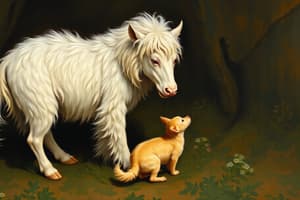Podcast
Questions and Answers
Which century saw the rise of livestock?
Which century saw the rise of livestock?
- 15th Century
- 19th Century
- 20th Century
- 16th Century (correct)
The Canadian Criminal Code permits willfully causing animals to suffer?
The Canadian Criminal Code permits willfully causing animals to suffer?
False (B)
What does NFAAC stand for?
What does NFAAC stand for?
National Farm Animal Care Council
The animal welfare and sustainable production are a focus of the ______ century.
The animal welfare and sustainable production are a focus of the ______ century.
Match the following categories of animals with their relevant societal context:
Match the following categories of animals with their relevant societal context:
What does domestication create?
What does domestication create?
Contractarianism posits that animals have moral standing.
Contractarianism posits that animals have moral standing.
What is anthropomorphism, as described in the context?
What is anthropomorphism, as described in the context?
Utilitarianism finds using animals morally acceptable if there is little to no _____.
Utilitarianism finds using animals morally acceptable if there is little to no _____.
Which philosophical approach asserts that animals have basic moral rights, including the right to life, liberty and respectful treatment?
Which philosophical approach asserts that animals have basic moral rights, including the right to life, liberty and respectful treatment?
The contextual approach considers all the views to be equally valid.
The contextual approach considers all the views to be equally valid.
What does the 'Respect for Nature' approach primarily deal with?
What does the 'Respect for Nature' approach primarily deal with?
Match the following philosophical approaches with their core belief:
Match the following philosophical approaches with their core belief:
Which committee does the Science Committee report to?
Which committee does the Science Committee report to?
Codes are legal documents.
Codes are legal documents.
According to the German laws, no harm should be done to animals without a _________ _________.
According to the German laws, no harm should be done to animals without a _________ _________.
Match the terms with their descriptions :
Match the terms with their descriptions :
What is the primary objective of the Animal Welfare Act, under german law?
What is the primary objective of the Animal Welfare Act, under german law?
Requirements under German law remain the same for every animal specie.
Requirements under German law remain the same for every animal specie.
Which of the following is NOT one of the 'Five Freedoms' of animal welfare?
Which of the following is NOT one of the 'Five Freedoms' of animal welfare?
What are codes made of?
What are codes made of?
The '3 Rs' of animal welfare are: Reintroduction, Research, and Refinement.
The '3 Rs' of animal welfare are: Reintroduction, Research, and Refinement.
What is the term used for experiments performed on living animals?
What is the term used for experiments performed on living animals?
The use of _______ is considered a form of humane killing for animals.
The use of _______ is considered a form of humane killing for animals.
Match the following terms with their descriptions:
Match the following terms with their descriptions:
What is an alternative housing system to conventional cages for sows?
What is an alternative housing system to conventional cages for sows?
Humans had a close relationship with animals during the hunter-gatherer period, often following their migration patterns.
Humans had a close relationship with animals during the hunter-gatherer period, often following their migration patterns.
Which Greek philosopher is associated with the practice of vivisection?
Which Greek philosopher is associated with the practice of vivisection?
According to Tinbergen, which of the following is NOT a category of questions when studying animal behavior?
According to Tinbergen, which of the following is NOT a category of questions when studying animal behavior?
Static postures are considered a type of active movement.
Static postures are considered a type of active movement.
Name one of the aspects of behavior that helps us understand why animals behave the way they do, as mentioned in the text.
Name one of the aspects of behavior that helps us understand why animals behave the way they do, as mentioned in the text.
According to the provided text, behavior evolution requires variation in behavior between _______.
According to the provided text, behavior evolution requires variation in behavior between _______.
Match the following terms with their corresponding descriptions, based on the provided text:
Match the following terms with their corresponding descriptions, based on the provided text:
Which of the following is a necessary component for behavior evolution?
Which of the following is a necessary component for behavior evolution?
Changes in color and shape are categorized as active movements in this context.
Changes in color and shape are categorized as active movements in this context.
What is one of the factors listed that can affect an animal's behaviour evolution ?
What is one of the factors listed that can affect an animal's behaviour evolution ?
Flashcards
Domestication
Domestication
The process by which animals become adapted to living with humans. It often leads to dependence and vulnerability for the animals.
Animal Rights
Animal Rights
The belief that animals have intrinsic moral value and deserve respect and consideration.
Utilitarianism
Utilitarianism
An ethical approach that focuses on the consequences of actions and aims to maximize happiness and minimize suffering for all beings, including animals.
Contractarianism
Contractarianism
Signup and view all the flashcards
Anthropomorphism
Anthropomorphism
Signup and view all the flashcards
Contextual Approach
Contextual Approach
Signup and view all the flashcards
Respect for Nature
Respect for Nature
Signup and view all the flashcards
The 5 Animal Freedoms
The 5 Animal Freedoms
Signup and view all the flashcards
Five Freedoms of Animal Welfare
Five Freedoms of Animal Welfare
Signup and view all the flashcards
Three Circles of Animal Welfare
Three Circles of Animal Welfare
Signup and view all the flashcards
Alternative Housing Systems
Alternative Housing Systems
Signup and view all the flashcards
Replacement in the 3 Rs of Animal Research
Replacement in the 3 Rs of Animal Research
Signup and view all the flashcards
Reduction in the 3 Rs of Animal Research
Reduction in the 3 Rs of Animal Research
Signup and view all the flashcards
Refinement in the 3 Rs of Animal Research
Refinement in the 3 Rs of Animal Research
Signup and view all the flashcards
Vivisection
Vivisection
Signup and view all the flashcards
Hunter-Gatherer Relationships with Animals
Hunter-Gatherer Relationships with Animals
Signup and view all the flashcards
Canadian Criminal Code on Animal Welfare
Canadian Criminal Code on Animal Welfare
Signup and view all the flashcards
NFAAC (National Farm Animal Care Council)
NFAAC (National Farm Animal Care Council)
Signup and view all the flashcards
NFAAC's Objective
NFAAC's Objective
Signup and view all the flashcards
NFAAC's Code Development Process
NFAAC's Code Development Process
Signup and view all the flashcards
Animal Welfare Principles
Animal Welfare Principles
Signup and view all the flashcards
Static Posture
Static Posture
Signup and view all the flashcards
Active Movement
Active Movement
Signup and view all the flashcards
Noises
Noises
Signup and view all the flashcards
Smells
Smells
Signup and view all the flashcards
Change of Color & Shape
Change of Color & Shape
Signup and view all the flashcards
Nikoldas Tinbergen
Nikoldas Tinbergen
Signup and view all the flashcards
Mechanism
Mechanism
Signup and view all the flashcards
Evolution
Evolution
Signup and view all the flashcards
Commodity group
Commodity group
Signup and view all the flashcards
Scientific Committee
Scientific Committee
Signup and view all the flashcards
Literature Review
Literature Review
Signup and view all the flashcards
Codes
Codes
Signup and view all the flashcards
Peer Reviewed
Peer Reviewed
Signup and view all the flashcards
Code Committee
Code Committee
Signup and view all the flashcards
Animal Welfare Act
Animal Welfare Act
Signup and view all the flashcards
Ethology
Ethology
Signup and view all the flashcards
Study Notes
Animal Welfare vs. Animal Rights
- Domestication creates a human-animal relationship with dependence and vulnerability, and animals have a moral status.
- Animal ethics explore what constitutes right or wrong conduct, aiming for moral good based on knowledge and reasoning.
- Anthropomorphism is the attribution of human characteristics to animals.
5 Humanity-Animal Views
- Contractarianism: Animals have no moral standing; it's acceptable to use and abuse them.
- Utilitarianism: Animal use/exploitation is acceptable if there's minimal suffering.
- Animal Rights: Animals have basic rights to life, liberty, and respectful treatment; they are sentient and have cognitive abilities.
- Contextual Approach: Existing views (contractarianism, utilitarianism, animal rights) are too restrictive; human relationships with animals vary depending on species.
- Respect for Nature: Deals with the loss of species.
Animal Welfare
- The 5 Freedoms (laws): Freedom from hunger, thirst, discomfort, disease, pain, injury, normal behavior, fear, and distress.
- 3 Circles of Animal Welfare: Basic health and functioning, affective states, and natural living. These overlap.
Breaking Animal Rights
- Conventional caging, sow gestation crates: Animal welfare issues
- Alternatives: Sow group housing and furnished housing systems.
- Humane killing: Captive-bolt pistols, electrical stunning, and CO2 gas.
3 R's
- Replacement: Avoid animal use whenever possible or replace with other methodologies.
- Reduction: Use fewer animals in research.
- Refinement: Minimize pain and distress while enhancing animal welfare.
Animals in History
- Hunter-gatherer relationships: Humans followed animal migration patterns.
- Early domestication (8,000 BCE): Marked a shift in human-animal relationship.
- Animal testing and medicine: Vivisection began with Aristotle experimenting on living animals.
- Dark Ages/Medieval Period: Humans relied heavily on animals.
- 15th Century: Rise of anti-vivisection movements.
- 16th Century: Rise of livestock farming.
- 20th - 21st Century: Growing focus on animal welfare and sustainable practices.
- Present day: Animals are central to various human activities (labs, teaching, wildlife, hunting, zoos, sporting, pets, and farming).
Welfare of Livestock
- Canadian Laws: Criminal Code prohibits causing animals suffering through neglect, pain, or injury.
- NFAAC (National Farm Animal Care Council): Coordinates a national approach to animal welfare in Canada, emphasizing stakeholder participation and science-informed consensus.
Code Development Process
- Initiation: National commodity groups begin the process.
- Review: Scientists review specific issues (3-6 issues per code).
- Committee Work: Committee assesses written reviews to create draft codes that go through a peer-review process.
- Finalization: Review by external experts, publication, and release of codes.
- Requirements: Codes contain acceptable and unacceptable practices; failures lead to corrective actions.
- Legal Status: These codes do not have legal status but aim to affect policy.
German Laws
- Animal Welfare Act: Focuses on the well-being of animals, driven by human responsibilities.
- Legal Consequences: Violating animal welfare laws can carry criminal penalties.
Animal Behaviour
- Ethology: Focuses on evolution and past behaviors, used for domesticated animals.
- Applied Ethology: Applies ethological principles to understanding animal behavior within present-day contexts.
- Animal Behavior: Includes everything an animal does—postures, movements, noises, smells, and color/shape changes.
- Dutch Biologist Nikolaas Tinbergen: Identified four categories of questions in animal behavior research.
- Research Importance: Understanding animal behavior is critical for animal care and welfare.
Aspects of Behavior (Evolution, Learning, etc.)
- Learning, Imprinting, Play, Genetics: Key aspects of animal behavior influencing development.
- Behaviour Evolution: Influenced by variations in behaviors, inheritability, advantages in certain behaviors, within individuals.
- Sexual Behavior: Includes parental behavior, distinction between altricial and precocial development, and personality, based on an interaction of genes and environment.
Studying That Suits You
Use AI to generate personalized quizzes and flashcards to suit your learning preferences.




